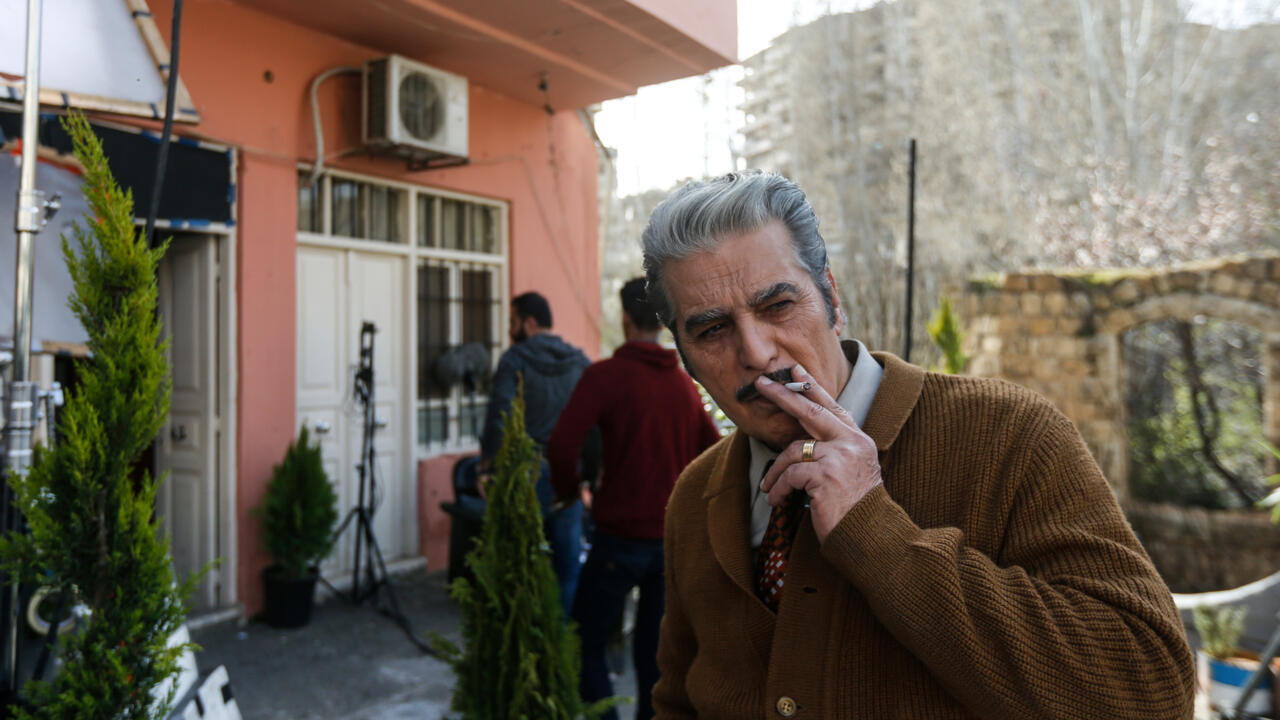Syrian-produced soap operas have long been popular in the Arab world, especially during the Muslim fasting month of Ramadan, a prime time for viewers in the region.
But since 2012, they have disappeared from the small screens of the Gulf monarchies, after the rupture of diplomatic relations between the government of Bashar al-Assad, accused of "crimes against humanity", and several countries in the region, including the Saudi Arabia, the United Arab Emirates, Kuwait, Bahrain and Qatar, which gave their support to the opposition and the rebels.
Triggered in 2011 by the repression of pro-democracy demonstrations, the conflict in Syria has left half a million dead, forced millions to flee and plunged 90% of the population into poverty.
On the set of the "Sursis" series in Damascus, the Syrian capital, on March 29, 2022 LOUAI BESHARA AFP
At the end of 2018 and after the successive victories of the Syrian power assisted militarily by the Russian ally, the signs of rapprochement between the monarchies of the Gulf with Damascus however multiplied, culminating in March with the visit of President Assad to the Emirates, an ally of Riyadh.
This year, for the first time in more than 10 years, the Saudi channel MBC, which had maintained only two Syrian soap operas that it produced itself, including the very popular "Bab al-Hara", has been broadcasting since start of Ramadan "Sursis", a series of Syrian productions addressing the conflict that is tearing the country apart.
"This is the first Syrian social drama broadcast on a Saudi channel" since 2011, series director Seif el-Sbei told AFP, saying the boycott of Syrian series was "probably due to political reasons In the region".
Syrian director Seif el-Sbei on the set of the "Sursis" series in the Syrian capital Damascus, March 29, 2022 LOUAI BESHARA AFP
Mr. Sbei said he hoped that the return of Syrian soap operas to Arab screens would be a "new breakthrough" in the cooperation between Syrian producers and Gulf channels.
Asked by AFP, the MBC channel, which also broadcasts the series on its Shahid streaming platform, declined to comment.
"Away from politics"
The series "Relief", whose screenplay is written by Ali Wajih and Yamen al-Hajali, was filmed in Wadi Barada, a suburb of Damascus and a former battlefield where rebels and Syrian pro-government forces clashed.
The series notably recounts the difficult return of displaced people to their place of origin, near the capital.
On the set of the Syrian series "Sursis" in the capital Damascus, March 29, 2022 LOUAI BESHARA AFP
In one scene, which depicts the early years of the conflict, an opposition sympathizer is seen being interrogated by the authorities before being forced to reveal the identity of another sympathizer who is arrested.
Asked by AFP, Mr. Hajali does not hide his joy at the idea that the series he co-wrote is broadcast on "one of the most important platforms in the Arab world".
And to add: "We have suffered from the boycott for years. Art must be seen as art, far from politics."
Saudi Arabia has still not restored its relations with the regime of Bashar al-Assad, but some observers believe that the end of the boycott of series produced in Syria is a sign of rapprochement between the two countries.
“Soap operas have surpassed politics,” according to Syrian researcher and journalist Badih Sanij.
"Ties between Saudi Arabia and Syria are re-established through TV dramas," and the restrictions that have been imposed on the artistic field because of politics are starting to ease," he added.
Syrian actors Abbas al-Nouri (l) and Yazan al-Khalil (d) on the set of the "Sursis" series in Damascus, the Syrian capital, on March 29, 2022 LOUAI BESHARA AFP
According to him, the return of Syrian productions to the channels of the Gulf countries will be "beneficial to both parties", including from a financial point of view.
"This is the beginning of a long road" towards the re-establishment of diplomatic relations, indicates for his part the producer of the series "Sursis", Ahmed al-Sheikh.
“Gulf channels represent essential (financial) support for Arab TV productions,” he says.
"We are at the beginning of the road, and I hope that this momentum will continue".
© 2022 AFP

